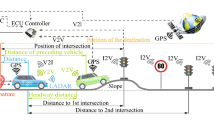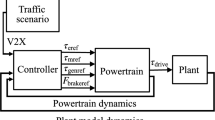Abstract
In this paper, we consider the fuel economy optimization problem for a mild hybrid electric vehicle (HEV) using hierarchical model predictive control. In the proposed algorithm, two problems are addressed: eco-driving and torque distribution. In the eco-driving problem, vehicle speed was controlled. Considering the reduction in fuel consumption and NO\(_x\) emissions, the torque required to follow the target speed was calculated. Subsequently, in the torque distribution problem, the distribution between the engine and motor torques were calculated. In this phase, engine characteristics were considered. These problems differ in terms of time scales; therefore, a hierarchical model predictive control is proposed. Lastly, the numerical simulation results demonstrated the efficacy of this research.
























Similar content being viewed by others
References
Ren, Y., Wu. Z. (2018). Research on the energy management strategy of hybrid vehicle based on Pontryagin’s minimum principle. In International Conference on Intelligent Human-Machine Systems and Cybernetics (IHMSC), pp. 356–361. Hangzhou, China.
Wang, W., Jia, S., Xiang, C., Huang, K., & Zhao. Y. (2014). Model predictive control-based controller design for a power-split hybrid electric vehicle. In Proceedings of International Conference on Modelling, Identification Control, pp. 219–224. Melbourne, Australia.
H. Li, N. Cui, C. Wang and Y. Du. Energy management strategy of plug-in hybrid electric vehicles considering the temperature effect of power battery. In The 3rd Conference on Vehicle Control and Intelligence (CVCI), 2019. Hefei, China.
Zhang, J., & Shen, T. (2016). Real-time fuel economy optimization with nonlinear MPC for PHEVs. IEEE Transactions on Control Systems Technology, 24(6), 2167–2175.
East, S., & Cannon, M. (2018). An ADMM algorithm for MPC-based energy management in hybrid electric vehicles with nonlinear losses. In IEEE Conference on Decision and Control (CDC), pp. 2641–2646. Miami, FL, USA.
Kamal, M. A. S., & Kawabe. T. (2015). Eco-driving using real-time optimization. In European Control Conference (ECC), pp. 111–116. Linz, Austria.
Pozzi, A., Bae, S., Choi, Y., Borrelli, F., Raimondo, D. M., & Moura. S. (2020). Ecological velocity planning through signalized intersections: A deep reinforcement learning approach. In IEEE Conference on Decision and Control (CDC), pp. 245–252. Jeju, Korea.
Amini, M. R., Wang, H., Gong, X., Pherson, D. L. M., Kolmanovsky, I., & Sun, J. (2020). Cabin and battery thermal management of connected and automated HEVs for improved energy efficiency using hierarchical model predictive control. IEEE Transactions on Control Systems Technology, 28(5), 1711–1726.
Zhang, J., Shen, T., & Kako, J. (2020). Short-term optimal energy management of power-split hybrid electric vehicles under velocity tracking control. IEEE Transactions on Vehicular Technology, 69(1), 182–193.
Hu, Q., Amini, M. R., Wang, H., Kolmanovsky, I., & Sun. J. (2020) Integrated power and thermal management of connected HEVs via multi-horizon MPC. In American Control Conference (ACC), pp. 3053–3058. Denver, CO, USA.
Uebel, S., Murgovski, N., Tempelhahn, C., & Baker, B. (2018). Optimal energy management and velocity control of hybrid electric vehicles. IEEE Transactions on Vehicular Technology, 67(1), 327–337.
Pontryagin, L. S., Boltyanskii, V. G., Gamkrelidze, R. V., & Mishchenko, E. F. (1962). The mathematical theory of optimal processes. Wiley.
Hong, W., Chakraborty, I., Wang, H., & Tao, G. (2021). Co-optimization scheme for the powertrain and exhaust emission control system of hybrid electric vehicles using future speed prediction. IEEE Transactions on Intelligent Vehicles, 6(3), 533–545.
Ma, Y., & Wang, J. (2019). Predictive control for NO\(_x\) emission reductions in diesel engine vehicle platoon application. IEEE Transactions on Vehicular Technology, 68(7), 6429–6440.
Sidik et al. M. A. B. (2019). Removal of NO\(_x\) from diesel engines vehicle: Simulation and experiment. In International Conference on Electrical Engineering and Computer Science (ICECOS), pp. 371–375. Batam, Indonesia.
Zhao, J., Hu, Y., & Gao, B. (2019). Sequential optimization of eco-driving taking into account fuel economy and emissions. IEEE Access, 7, 130841–130853.
Lin, C. C., Peng, H., Grizzle. J. W. (2004). A stochastic control strategy for hybrid electric vehicles. In Proceedings of the 2004 American Control Conference, pp. 4710–4715. Boston, MA, USA.
Dextreit, C., Kolmanovsky. I. (2010) Approaches to energy management of hybrid electric vehicles: Experimental comparison. In UKACC International Conference on Control, Coventry, UK.
Zhuang, W., Wang, L., Yin, Z., Ye, J., & Wu, H. (2014). Optimal energy management strategy design for a diesel parallel hybrid electric vehicle. In The 11th IEEE International Conference on Control and Automation (ICCA), pp. 1050–1055. Taichung, Taiwan, China.
Liu, Y., Canova, M., & Wang, Y. Y. (2020). Distributed energy and thermal management of a 48-V diesel mild hybrid electric vehicle with electrically heated catalyst. IEEE Transactions on Control Systems Technology, 28(5), 1878–1891.
Author information
Authors and Affiliations
Corresponding author
Rights and permissions
About this article
Cite this article
Umezawa, Y., Yamauchi, K., Seto, H. et al. Optimization of fuel consumption and NO\(_{{\varvec{x}}}\) emission for mild HEV via hierarchical model predictive control. Control Theory Technol. 20, 221–234 (2022). https://doi.org/10.1007/s11768-022-00097-9
Received:
Revised:
Accepted:
Published:
Issue Date:
DOI: https://doi.org/10.1007/s11768-022-00097-9




